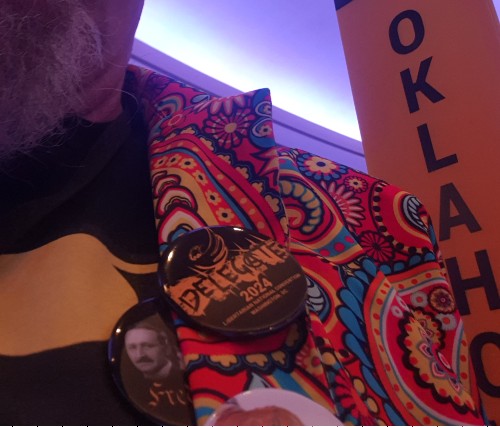
In presidential election years, the Libertarian Party holds its national convention over Memorial Day Weekend. I returned home from my ninth such convention yesterday.
Donald Trump and RFK Jr. spoke at our convention. You’ve probably heard about that.
We chose a presidential ticket: Chase Oliver and Mike ter Maat. You may have heard about that as well.
Unless you were actually there, or watched and paid very close attention on C-SPAN, though, you probably didn’t notice some of the ways in which a Libertarian National Convention differs from the way the “Big Two” parties do business.
The “Big Two” conventions aren’t really conventions. They’re campaign commercials.
Democratic and Republican delegates know who their presidential candidate is long before they arrive, because they are (for the most part) “bound” delegates. They’re required to vote for the candidate who won their states’ primaries and caucuses.
Democratic and Republican delegates know who their vice-presidential candidate is because their presidential candidate tells them who he or she wants. They then cast a ceremonial vote to approve.
Democratic and Republican delegates generally ratify the platform and bylaws presented to them by insider-dominated party committees. They don’t HAVE to agree, but once again it’s pretty much just ritual.
Libertarian Party convention delegates — around a thousand of them, plus alternates — sit in a crowded room for several days actually making decisions. On Sunday, business commenced at 9am and wrapped up well after midnight.
Our delegates are “unbound” and free to vote for the presidential and vice-presidential candidates we find most persuasive. Many of us arrive at the convention undecided and choose a candidate who’s actually talked not just TO us but WITH us. It often takes several rounds of balloting to choose. This year, we voted seven times, eliminating candidates with the fewest votes, before Chase Oliver received a majority vote for president. It took two ballots to choose Mike ter Maat for the veep slot.
We also choose our chair, other officers, and national committee at the convention. Those races are also often as hotly contested as the presidential race.
And we actually debate our platform and bylaws changes.
Our convention is fun, but it’s neither a campaign commercial nor a series of cocktail parties and bar crawls. It’s work. It’s HARD work. It’s IMPORTANT work. For some, it’s heart-breaking work, followed by a difficult process of trying to hug it out and move on.
Why bother? Because every person in that room loves freedom, hates tyranny, and wants to offer Americans — including you — a chance to enthusiastically vote for what they love most, maybe for the first time, instead of reluctantly voting, yet again, against whomever they fear most.
That’s what we accomplished.
You’re welcome.
Thomas L. Knapp (Twitter:@thomaslknapp) is director and senior news analyst at the William Lloyd Garrison Center for Libertarian Advocacy Journalism (thegarrisoncenter.org). He lives and works in north central Florida.
PUBLICATION/CITATION HISTORY


